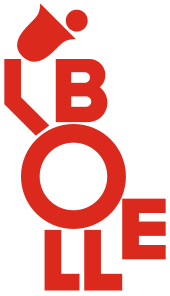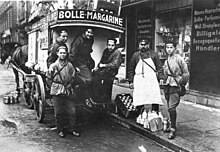C. Bolle dairy
The C. Bolle dairy was a dairy retail company founded in Berlin in 1879 by Carl Bolle . The Bolle dairy went through mergers and changes of ownership. The brand has been owned by Campina GmbH since 2000 . There were also individual trading companies under the name Bolle, mostly limited to Berlin and Cologne , including the Bolle supermarket .
Historical development
In the 1870s and 1880s, imperial Berlin was experiencing strong growth, the city expanded and the need for perishable agricultural products such as milk , butter , eggs, meat, vegetables and fruit could no longer be adequately met by the small, mostly rural trade supplies.
Carl Bolle , a versatile entrepreneur, began, among other things, from 1879 to supply the city with milk and milk products that came from his cows that grazed not far from his tree nursery at Lützowufer 31 and were originally used as fertilizer suppliers. Milk was initially sold locally in a milk bar , and over the next two years increasingly via milkmaids who pulled jugs through town with handcarts.
From around 1881 teams of horses were introduced, each manned by a boy as a coachman ( popularly known as Bolle because of the inscription on the wagon ) and a milkmaid ( Bolle girl ) who delivered the milk and had the cash register with her in a tied leather bag . Both were in uniform. Bolle and Bolle girls were a popular part of the cityscape and spread news and cheeky sayings.
The Bolle dairy became the largest and best-known dairy company of the time, at times had over 250 wagons and thousands of employees. After 1879, it moved to a larger company site in Alt-Moabit , where fresh milk was accepted and processed from a radius of 200 km, mostly from Brandenburg and by train. It was not insignificant for this milk boom that the milk was checked and filtered and was neither watered down nor acidic. Cheese, quark and margarine were also delivered.
The first approaches to industrial milk cooling with ice from the Landwehr Canal began in the winter of 1885. From 1900, pasteurized milk came onto the market for the first time , initially in sealed bottles for small children and infants. Many of the employees found accommodation in the tenements built by Carl Bolle, who also financed charitable purposes with his enormous fortune and was appointed to the council of commerce and in 1909 even to the secret council of commerce .
Connected to the history of the C. Bolle dairy is the building of the Theater des Westens in Charlottenburger Kantstrasse in 1896, where the company's coal storage yard was previously located.
In 1969 the production of dairy products in the Moabit branch was stopped. From 1971, Ernst Freiberger had ice cream made on the site . He also bought a pizza bakery in which frozen products such as pizza , baguette and pasta were produced. Freiberger developed the company into one of the largest frozen food providers in Europe.
From 1994, under Freiberger's significant influence - after an exchange of space with the neighboring Focus Teleport site - the Spree-Bogen , an office and commercial park, was built that housed the Federal Ministry of the Interior from 1999 to 2015 , which was the only Federal Ministry to work in rented rooms . Since then, the ministry employees have been working in a new building, which was also built in Alt-Moabit in Berlin-Mitte . During this time, a hotel ( Abion Spreebogen Waterside ) with 243 rooms for guests was established in parts of the building .
Buildings
The company headquarters was in Berlin-Moabit , Alt-Moabit 98-103, from the 1880s , until 1886 the location of the Schumann porcelain factory. Carl Bolle had bought the property and had it converted according to his ideas. A representative main entrance led to the site, which is dominated by a three-storey brick building between the Spree and the Alt-Moabit street. All the production and logistics departments were located in this building on the two lower floors. In the head building of the Alte Meierei , Bolle had a chapel installed , which served as a resting point for his employees. The chapel had an altar , colorful mosaic windows, a gallery and offered space for 1,600 people. The interior had a floor area of 750 square meters and was around eight meters high. In 1919 the chapel was converted into a cinema , for which the windows were bricked up and the altar and gallery removed. It was one of the first Berlin cinemas, which later, as the theater of the Berliner Kammerspiele, introduced countless elementary school children into the world of theater.
The upper floor with the former cinema hall, originally Bolle's own company chapel and later known as the "Weltkino", had been empty since 1999. From the 2010s onwards, Ernst Freiberger junior (the son of Ernst Freiberger) developed a new concept for its use in close cooperation with the hotel manager of the Abion at the time , Bernd Eulitz . The hall was redesigned according to plans by the architects Ansgar Schmidt and Henning Ziepke into a large, modern multi-purpose hall in industrial design and is now called the chapel again . Everything was renovated with great attention to detail. After all, the eventful history of this place can be found in many details. The architects mentioned designed the former office rooms below to create stylish side rooms for guest cloakrooms and as individual meeting rooms. The second large hall, the ballroom , which is located behind the chapel , is not quite as large as the first, but still shows many relics of the old production hall with twelve cast-iron columns , the anthracite-colored, stone-paved floor and the largely preserved and renovated original wooden ceiling. As a tribute to Bolles milk products had Freiberger in ballroom rework historic Bottles and these three big round chandeliers together. The 300 small glass bottles, arranged in an ascending cone shape, give the room a solemn appearance.
Both halls and office rooms together offer an area of around 3000 square meters. In addition, part of the roof was converted into a terrace. The event area was opened in summer 2015 under the direction of Sebastian Kernchen and has since been available for events for up to 800 people. Freiberger had invested around four million euros in all the renovation work . It is planned to hold 80 to 90 major events per year.
Milkmaid bill
While the distribution networks of perishable products from the producer regions of the Brandenburg area up to the customer could already be organized centrally around the turn of the 20th century and the purchase price could largely be determined by the industry, the return of capital from the city was mostly unpredictable and entrepreneurial View a risk. Fresh milk spoils even with a slight delay in the process. On the other hand, the turnover arose from the collection of small amounts and was dependent on exact accounting for the customers, who often had a very friendly relationship with their milkmaids. Customers only bought a small, fresh amount every day, but each time a different amount. Deficiencies in the arithmetic skills of the employees could have a noticeable effect, especially since they were assistants who had little education and also had to be selected according to other criteria, such as the ability to drive carts, look after the horses, repair the To clean the car and keep it clean. The accounting in the individual sales of many perishable small quantities was a serious problem at the time. Because of the simple calculation scheme , this could also be the reason for the origin of the term milkmaid bill .
literature
- Meierei C. Bolle AG (Ed.): Bolle 1881–1961. (Festschrift) Berlin 1961.
Web links
- Aro Kuhrt: "Bolle offers the best". (2008) at www.berlinstreet.de , last accessed on May 7, 2015
Individual evidence
Coordinates: 52 ° 31 '28.9 " N , 13 ° 20' 47.2" E
- ↑ a b c Uwe Aulich; Article in the Berliner Zeitung of June 9, 2015 "Bolle-Meierei in Berlin-Moabit Old industrial buildings become spectacular party locations"
- ↑ Herbert Cerutti: milk maid bill. In: NZZ Folio. May 1999, accessed February 24, 2020 .



